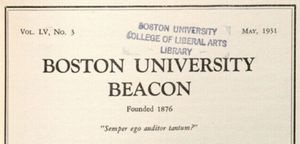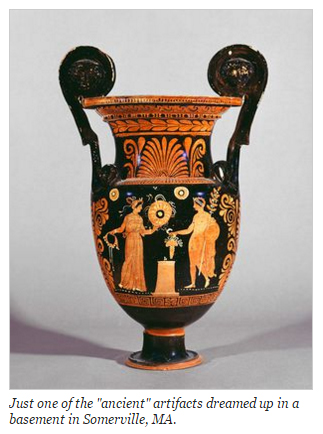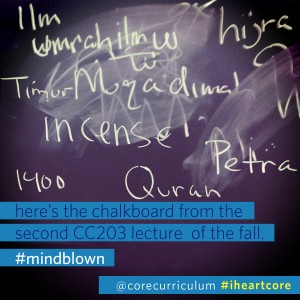October 8, 2015 at 10:23 am

It seems folks are always fretting about the juvenile hijinks taking place on college campuses. However, going through some BU archives, we find an opinion expressed in 1931 that the immaturity was more or less over. Has this observation been borne out? You be the judge.
From an editorial titled “Growing Pains”, published in a 1931 issue of The Boston University Beacon, the campus literary/commentary magazine first published in1876.:
 Signs that the college student is growing up have been a source of satisfaction, in recent years, to educators who have the dignity of the human race at heart. In the more sophisticated colleges hazing has disappeared. Fraternity initiations have become milder and in some cases have been left off entirely as the world rolls on toward bigger and better nobility. Only this year at Boston University, Sophomores have stopped teasing the Freshmen publicly, and Open House night has gone the way of all collegiate indecorum. Even the Junior Prom — almost –. Can it be that the era of jazz is passing; that students are finding more fun in less riotous ways; that even perhaps ye good old stars are again lending themselves for hitching-posts?
Signs that the college student is growing up have been a source of satisfaction, in recent years, to educators who have the dignity of the human race at heart. In the more sophisticated colleges hazing has disappeared. Fraternity initiations have become milder and in some cases have been left off entirely as the world rolls on toward bigger and better nobility. Only this year at Boston University, Sophomores have stopped teasing the Freshmen publicly, and Open House night has gone the way of all collegiate indecorum. Even the Junior Prom — almost –. Can it be that the era of jazz is passing; that students are finding more fun in less riotous ways; that even perhaps ye good old stars are again lending themselves for hitching-posts?
A distinction arises here between what is good and what is not so good in this tendency towards quietness. Very few are going to regret those lesser and greater forms of silliness known as “informal initiations.” A large number, on the other hand, who have enjoyed running around from house to house — on such a night as Open House Night, — laughing, singing, remeeting a whole University’s acquaintances in a few hours, will mourn the abolishment of such an institution. But it is understood by all concerned that Boston University is not yet a campus college and Boston citizens still have their privileges — so patience is called in.
But to mourn –? surely this is not the adult spirit! No, we are afraid it is not. We are not even sure that we want it.
So, all those like us, who are having a hard time growing up, who like the Pickwickian flavor in their fun, who could have had a great old time at a Mr. Wardle’s Christmas Party, and who like to shout around the place once in a while just because they feel good — all those, we invite to join with us in a hurray for having had Junior Week, with Prom, “Pirates,” and Nickerson Field with its spring woods, to ease our growing pains in.
[Vol. LV, No. 3]
Read More »
By zakbos
|
Posted in Other Publications
|
Tagged history, Throwback Thursday
|
October 2, 2015 at 9:37 am
 From the October 7, 2010 issue of The Onion:
From the October 7, 2010 issue of The Onion:
"Honestly, we never meant for things to go this far," said Professor Gene Haddlebury, who has offered to resign his position as chair of Hellenic Studies at Georgetown University. "We were young and trying to advance our careers, so we just started making things up: Homer, Aristotle, Socrates, Hippocrates, the lever and fulcrum, rhetoric, ethics, all the different kinds of columnseverything."
Five years after the revelation that Ancient Greece was a made-up load of bunk, what has changed? Not much. The Core Curriculum still teaches students about the Parthenon, the Peloponnese war, the epic poetry of Homer, and it does so with a straight face. Incorrigible.
(Read the full article in theOnion archives, here.)
By zakbos
|
Posted in Friday Fun
|
Tagged Ancient Greece, humor
|
September 21, 2015 at 9:27 am
 To current Core students, Dantes Inferno, Purgatorio and Paradiso marks theculmination of first year Core. Yet, toItalians, Dantes work of literature is referenced through academics, politicians and media. Dante is marked with a reverence by Italy for his ability to create a national language in the country. John Kleiner marks Italys celebration of the poets 750 birthday.
To current Core students, Dantes Inferno, Purgatorio and Paradiso marks theculmination of first year Core. Yet, toItalians, Dantes work of literature is referenced through academics, politicians and media. Dante is marked with a reverence by Italy for his ability to create a national language in the country. John Kleiner marks Italys celebration of the poets 750 birthday.
An excerpt:
For the last nine months, Ive been living in Rome, and the experience has helped me to appreciate another, more subversive side to Dantes appeal. Though he may be force-fed to seventh graders, applauded in the Senate, and praised by the Holy See, Dante is, as a writer, unmistakably anti-authoritarian. He looks around and what he sees is hypocrisy, incompetence, and corruption. And so he strikes out, not just at the Popes, whom he turns upside down and stuffs in a hole, but also at Florences political leaders, whom he throws into a burning tomb, and his own teacher, whom he sets running naked across scorching sand.
To read more about the poets everlasting hold on the Italy, check out the full article here.
By CAS Core Curriculum
|
Posted in Great Books, Great Personalities, Other Publications
|
Tagged birthday, CC102, dante
|
September 15, 2015 at 8:01 am

Reminder: All Core lectures are
open to all members of the campus
community, including alumni.
By zakbos
|
Posted in Academics, Great Photograph
|
Tagged CC203, note
|
September 8, 2015 at 10:08 am

Michael Morgenstern for The Chronicle
Over at The Chronicle Review, a faculty member tells the story of how she was wondering why her students were always late, and what they told her when she asked them why. An excerpt:
Overall, students were much more understanding about tardy arrivals than I, and that got me thinking: Was I worrying too much about something that most students find irrelevant? I set out once more to find a solution to the tardiness, but this time, one from their point of view. I turned to my students and asked: "What can instructors do to motivate you to come to class on time?"
Read the rest ofStephanie Reese Masson's essay about addressing tardiness, and the gap between a student view of class responsibility's and a teacher's, here.
By zakbos
|
Posted in Other Publications
|
August 5, 2015 at 5:13 pm
"Justice" is something of a buzz word in the Core: what it means, how it should be administered, and what constitutes a crime are just a few of the topics that are addressed by writers like Plato, Aristotle, Confucius, and Dante. For the most part, these great thinkers propose systems wherein criminals are punished retroactively for their wrongdoings. This model works under the assumption that criminals operate under free will and are not affected by factors like poverty and mental illness.
Adam Benforado proposes in the August 7th edition ofThe Chronicle Reviewthat the reality is not so straightforward. Many criminals are actually suffering under various circumstances that are aggravated by their being taken to jail. What we should do instead, he suggests, is take a public-health approach to criminal justice that helps prisoners to recover and assimilate back into society rather than take revenge upon them. Benforado writes:
... [A] public health model of crime allows us to shift resources from punishment to prevention. A reactive criminal-justice system, like the one we have now, is doomed to always come up short. There is no execution that can compensate for a victim's murder. There is no appeal process that can restore the lost years of a wrongful conviction. In the future, our major tools for fighting crime will not be police officers, trials, and incarceration, but better prenatal intervention, improved schools, and widely available mental health care.
This article provides some interesting food for thought for summer readers who can't get Core ideas out of their head; in fact, this entire issue of The Chronicle Review will challenge your conceptions of justice both in theory and in practice. Be sure to stop by the Core office and give it a read!
By CAS Core Curriculum
|
Posted in Great Ideas, In the News, Other Publications
|
Tagged CC101, CC102, free will, Inequality, justice, Plato
|
July 28, 2015 at 1:08 pm

Here at the Core, we spend a great deal of time examining a wide range of perspectives on morality, returning semester after semester to examine questions such as "how do we define right and wrong?" and even "do right and wrong really exist?"
As we explore these ethical questions through the lenses of science, literature, and philosophy, it can be helpful to reference professional ethicists to shed light on our discussion.
Eric Schwitzgebel, philosophy professor at UC Riverside, takes a 'meta' approach to these conversations in a recent piece for aeon magazine, titled "Cheeseburger ethics". In the piece, he raises intriguing questions, such as: "Are ethics professionals good people, and if not, what is the point in learning ethics?" And further, he wonders about the ethics of professional ethicists:
When I meet an ethicist for the first time by ethicist, I mean a professor of philosophy who specialises in teaching and researching ethics its my habit to ask whether ethicists behave any differently to other types of professor. Most say no.
Ill probe further: why not? Shouldn't regularly thinking about ethics have some sort of influence on ones own behaviour? Doesn't it seem that it would?
We recommend this piece as being 1) entertaining, 2) provocative, and 3) not visibly unethical. If you're hungry for some stimulating summer reading, check it out ataeon.
This post contributed by Core summer staffer Michael Enwright.
By CAS Core Curriculum
|
Posted in Great Ideas, Other Publications
|
Tagged ethics
|
Signs that the college student is growing up have been a source of satisfaction, in recent years, to educators who have the dignity of the human race at heart. In the more sophisticated colleges hazing has disappeared. Fraternity initiations have become milder and in some cases have been left off entirely as the world rolls on toward bigger and better nobility. Only this year at Boston University, Sophomores have stopped teasing the Freshmen publicly, and Open House night has gone the way of all collegiate indecorum. Even the Junior Prom — almost –. Can it be that the era of jazz is passing; that students are finding more fun in less riotous ways; that even perhaps ye good old stars are again lending themselves for hitching-posts?









